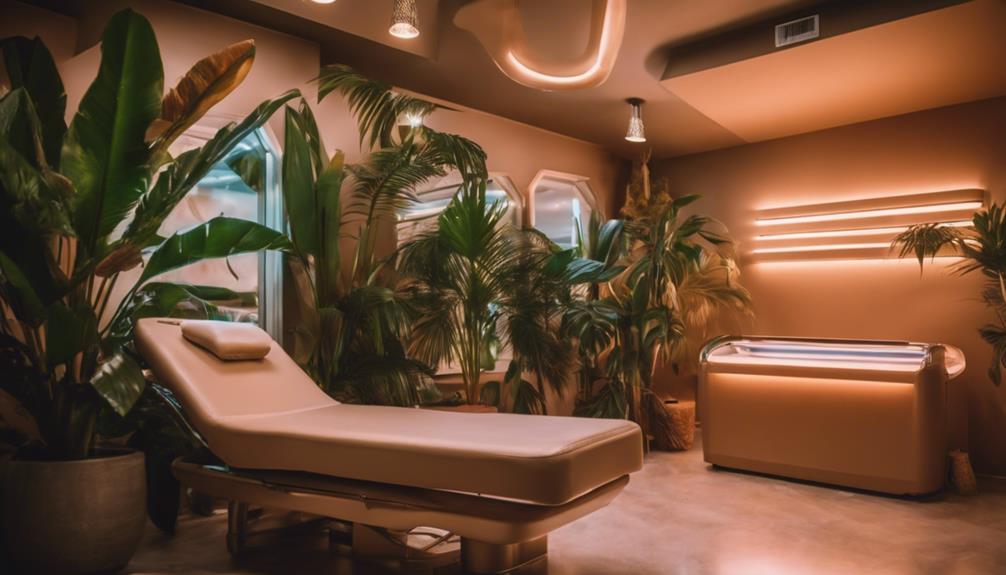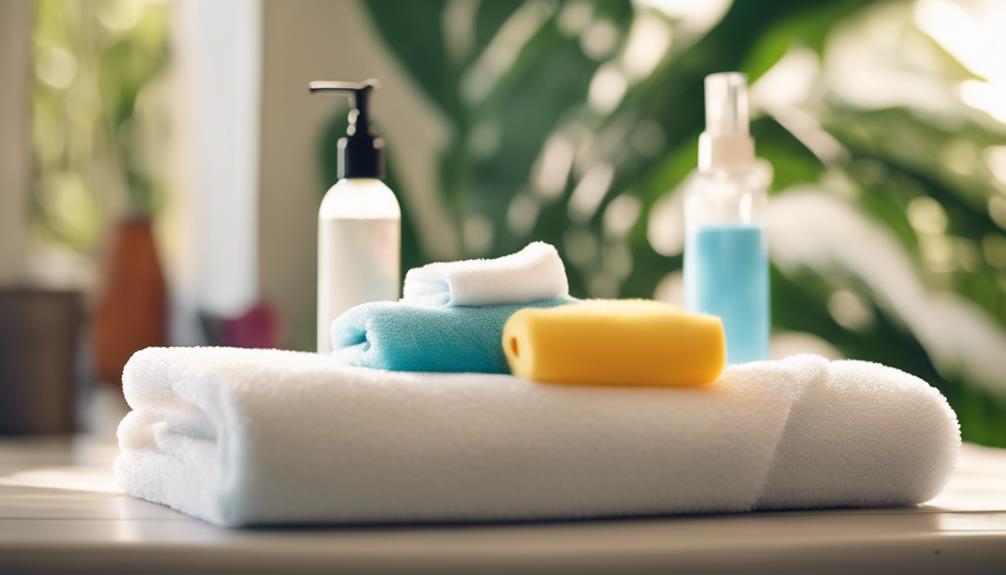Tanning can help you achieve that desired sun-kissed appearance, but it is crucial to prioritize safety. Begin by exfoliating your skin to create a smooth base, and remember to moisturize with a non-oil product. Opt for modern tanning beds that emphasize UVA rays as they are less harmful. Always wear protective goggles to avoid raccoon eyes; it’s not a good look! Understand your skin type; lighter skin tones should limit tanning sessions to 5-8 minutes, while darker skin tones can go up to 12. Watch out for signs of overexposure such as redness or dizziness. Remember, prioritizing safety results in the best tan. Looking for additional insider tips?
Key Takeaways
- Exfoliate and moisturize your skin before tanning to ensure an even application and maximize results.
- Choose a modern tanning bed that provides optimal UVA exposure while minimizing UVB risks.
- Limit session durations based on your skin type: 5-8 minutes for lighter skin and 10-12 minutes for darker skin.
- Always wear protective goggles to shield your eyes from harmful UV rays during tanning sessions.
Tanning Preparation and Skin Care
To achieve a flawless, sun-kissed appearance, you should start by exfoliating your skin to remove dead cells and guarantee an even tanning surface. Think of it as prepping your canvas before painting—every little bit helps!
Next, apply a non-oil-based moisturizer to hydrate your skin; you want it smooth and ready to soak up that lovely tan.
Don't forget, your skin's melanocytes play a key role in producing melanin, which is essential for that golden glow. By preparing your skin properly, you can maximize your tanning results.
Choosing the Right Tanning Bed

Finding the right tanning bed can greatly enhance your tanning experience and help you achieve that sun-kissed glow more effectively.
So, how do you choose? Look for state-of-the-art beds that offer ideal UVA exposure while keeping UVB to a minimum.
After-bronzers are a game changer too; they give you that even tan without those pesky pressure points.
Have you considered stand-up machines? They provide excellent coverage and can be fun to use!
And don't forget about eye protection—your peepers deserve some TLC!
Pairing the right bed with a good tanning lotion can really boost your results.
Session Duration Guidelines

Understanding the right session duration is essential for achieving a safe and effective tan without risking skin damage.
You've got to know your skin type—it plays a big role! For lighter skin, stick to shorter sessions, around 5 to 8 minutes. If you've got a medium or darker complexion, you might stretch it to 10 or 12 minutes.
Remember, patience is key! It's tempting to go longer for a quick tan, but that can lead to burns. Ever heard the saying, “Good things come to those who wait”? Well, it applies here too!
Keep a timer handy to avoid overdoing it. After all, you want that sun-kissed glow, not a lobster look!
Enjoy your tanning journey, and stay safe!
Importance of Eye Protection

Protecting your eyes during tanning sessions is just as important as managing your skin exposure to UV rays. Think about it: your eyes are precious, and they deserve some TLC too!
Wearing goggles isn't just a fashion statement; it prevents long-term damage from UV rays. Plus, you'll dodge those raccoon eyes that can spoil your glow!
Don't forget, the skin around your eyes is thinner and more vulnerable, so shield it well. And please, leave your contacts at home; they can react badly with tanning beds.
While you're at it, slather on some SPF lip balm to keep your lips safe too. So, gear up and protect those peepers—your future self will thank you!
Signs of Overexposure

Redness and discomfort are often the first signs that you've overexposed your skin to UV rays during tanning sessions. If you notice these symptoms, it's time to take a break! Other signs include blistering or peeling, which can feel like your skin's throwing a tantrum. Dizziness or nausea? That's your body saying “Whoa there!” Here's a quick guide to keep you informed:
| Signs of Overexposure | What to Do |
|---|---|
| Redness | Stop tanning immediately |
| Blistering | Seek medical advice |
| Dizziness | Hydrate and rest |
| Sunburn-like symptoms | Apply soothing lotion |
Selecting Tanning Products

After recognizing the signs of overexposure, it's important to choose the right tanning products that enhance your experience while keeping your skin safe.
You'll want to look for lotions that boost melanin production, giving you that golden glow without the nasty side effects. Ever tried a bronzer? They can give you an instant color lift!
Don't forget about moisturizers—they keep your skin hydrated and help your tan last longer. And hey, check if your products are compatible with indoor tanning; you wouldn't want a surprise reaction!
So, grab those products with care, and remember: a little prep goes a long way.
What's your favorite tanning product? It might just be the secret to your sun-kissed success!
Understanding UV Levels

Understanding UV levels is essential for ensuring safe tanning practices and maximizing your results while minimizing skin damage. You've probably heard about UVA and UVB rays, but do you know what they really do? Here's a quick guide to help you out:
| UV Type | Effects | Safety Tips |
|---|---|---|
| UVA | Penetrates deeply, ages skin | Use protective lotion |
| UVB | Causes sunburn, promotes tanning | Limit exposure time |
| UVC | Harmful, filtered by atmosphere | Avoid direct exposure to UVC |
Knowing your skin type and the UV levels in your tanning bed can make a big difference. So, don't forget to check those UV levels before you jump in! Your skin will thank you later!
Healthy Tanning Alternatives

If you're looking for a sun-kissed glow without the risks of tanning beds, there are several healthy alternatives you can explore.
Have you ever tried self-tanning lotions or sprays? They're easy to use and can give you that desired bronze without harmful UV exposure! Plus, you can choose from different shades to match your skin tone perfectly.
Another option is bronzing powder, which can add instant color and can be washed off at the end of the day – talk about flexibility!
And don't forget about tinted moisturizers; they hydrate your skin while providing a subtle glow.
Frequently Asked Questions
How Often Should I Exfoliate Before Tanning Sessions?
You should exfoliate your skin 1-2 days before tanning sessions. This helps remove dead skin cells, ensuring an even tan. Don't forget to hydrate your skin afterwards for the best results.
Can I Use Self-Tanner After Salon Tanning?
You might wonder if using self-tanner after salon tanning is wise. It's best to wait a few days. This way, you allow your skin to settle and maintain that beautiful, even glow you just achieved.
What Should I Do if I Get Sunburned?
If you get sunburned, cool your skin with aloe vera or a soothing lotion. Stay hydrated and avoid further sun exposure. If severe, consult a doctor for appropriate treatment. Your skin needs care and time to heal.
Are There Specific Age Restrictions for Tanning Beds?
Tanning beds can feel like an enticing sunbeam, but they often have age restrictions. Most places require users to be at least 18, ensuring skin's youthful glow isn't prematurely exposed to harmful UV rays.
How Can I Maintain My Tan Longer?
To maintain your tan longer, keep your skin moisturized, hydrate by drinking plenty of water, avoid harsh exfoliants, and limit sun exposure. Regularly apply a tan extender lotion for the best results.
What Hygiene Practices Should I Follow for Safe Salon Tanning?
When going for salon tanning sessions, it’s crucial to follow some essential tanning hygiene tips. Always ensure that the salon provides clean towels, sanitized tanning beds, and disposable eye protection. Keep your skin exfoliated and avoid wearing makeup or lotions to prevent clogging pores. These practices will help you enjoy a safe tanning experience.
Conclusion
So, ready to glow like a summer sunset?
By following these tips for safe salon tanning, you can rock that beautiful tan without the skin drama.
Remember to prep your skin, pick the right bed, and always protect those peepers!
With a little care, you'll not only look great but feel great too.
After all, who wouldn't want to shine like a star while keeping their skin happy and healthy?
Now, let's get tanning!









